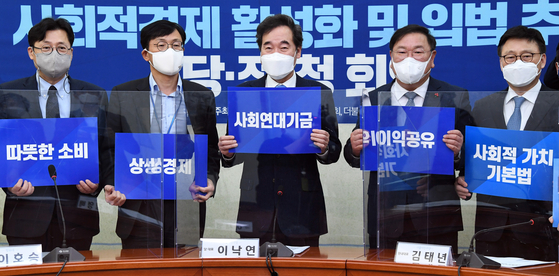
Together with the Democratic Party leader Lee Nak-yeon and Kim Tae-nyeon, the representatives of the hospital are taking commemorative photos with hand signs that read’Social Solidarity Fund’ and’Profit Sharing’, respectively. In the passport, concerns about the social solidarity fund and the profit-sharing system prepared as a way to coexist amid the Corona 19 economic crisis, companies are concerned that it is a “arm twist policy.” Reporter Oh Jong-taek
In addition, the Democratic Party will promote a plan to leverage the investment of all pension funds, including the national pension, to induce corporate participation in the benefit-sharing system and social solidarity fund.
Lee Nak-yeon, head of the Democratic Party, said at the party, government, and government meetings for promoting social economy and legislative action held at the National Assembly on the afternoon of the 28th, “One of the ways (encouraging participation in the benefit-sharing system) is strengthening incentives, but a strong way to make a soft landing. I look for it at ESG.”
ESG refers to factors that evaluate a company’s non-financial soundness, such as the environment, social, and governance.
The National Pension Service began reflecting ESG evaluation in investment decisions in 2019, and plans to expand ESG value-reflecting assets to 50% of its total assets by 2022.
CEO Lee said, “Even with the formation of a profit-sharing system and social solidarity fund, I think it can be an incentive (in a way) to decide whether to invest in pension funds, including the national pension, through ESG evaluation, or to reflect it in public procurement.”
The Democratic Party plans to reflect whether companies participate in the benefit-sharing system and social solidarity fund through ESG evaluation even in public procurement.
Representative Lee said, “It is not necessary to amend the law to reflect it in the pension fund investment, but to reflect it in public procurement, it is necessary to amend the procurement law.” A key Democrat said, “If ESG evaluation is reflected in the process of investing in pension funds or public procurement, less money will be spent on profit-monopoly companies and more profits will be made for profit sharing companies. This is a market-friendly incentive system.”
However, in the power of the people, complaints arose that “the ruling party is forcing the profit-sharing system on companies”. Rep. Gyeong-ho Choo said, “I asked to do it voluntarily, but I think it will not work, so I take out the ESG and wrap it in’voluntary’ and force it,” he said. “It makes no sense for the politicians to use the ESG evaluated by the society as a profit sharing indicator.” Rep. Song Eon-suk also criticized, “Isn’t this representative Lee pretending to be’voluntary participation’, and eventually revealed that he would be forced to do it in connection with ESG.”
In this regard, Professor Dong-geun Cho (economics) of Myongji University said, “There are not a lot of problems because ESG is subjective evaluation in the first place. It’s just that.”
The Democratic Party, which occupies 174 out of 300 seats, agreed to deal with five bills, including: ▶ The Basic Social Economy Law ▶ The Basic Social Value Law ▶ The Village Enterprise Fostering Law ▶ The Credit Cooperatives Law ▶ The Common People’s Financial Assistance Act, through the party, government, and government meetings. . The list of 103 bills, including these bills, was also finalized at the Congressional Assembly held on the second day following the previous day.
Meet Park Yong-man and’Apple the Company’

Democratic Party leader Kim Tae-nyeon (right) and Park Yong-man, chairman of the Korean Sangsang, met on the 28th to have a discussion on regulatory innovation. Regarding the attendance of nine legislative lawmakers from the Democratic Party at the event on this day, Kim said, “The strongest team has come to deal with the Regulatory Innovation Law. It’s not just words, but to show the will to deal with it properly.” Reporter Oh Jong-taek
The Democratic Party’s list of bills also included regulatory reform bills that companies have been demanding, such as the Domestic Service Industry Promotion Act (Household Service Act) and the’Regulatory Sandbox 5 Act’. The main purpose of the House Service Act is to remove the possibility of violating the Labor Law by releasing regulations on the domestic service industry, which is limited to individual transactions. The’Regulatory Sandbox 5 Act’ is to ensure that related business activities continue to be guaranteed even after the special period in which regulations were postponed for new products and services in new technologies and new industries.
Previously, Democratic Party leader Kim Tae-nyeon held a policy meeting on the morning of this morning on the topic of Korean consultation and regulatory innovation. President Park Yong-man said on the day, “The old laws and systems in the industrial era are acting as a stumbling block. I hope that the laws that block corporate innovation can be revoked at once.” Soon after the meeting, Kim Won-nae met with reporters and replied that “(at an extraordinary National Assembly in February) the Basic Law on Service Industry Development will be immediately deliberated.”
However, the Democratic Party still emphasized corporate social responsibility even here. After all remarks at the meeting, Kim Won-nae said, “EsG that responds to environmental crises, creates social values, and makes governance transparent has become a new topic.” “(Company) innovates old structures, practices, culture, and reinforces social responsibility. I think it is also a task.”
Reporters Oh Hyun-seok, Kim Jun-young, Nam Soo-hyun [email protected]
